Expert Advisory Group on Climate Change and Democracy
International IDEA’s new workstream on Climate Change and Democracy is supported by an external Expert Advisory Group that is composed of experts with diverse personal, regional, and scientific backgrounds as well as professional experience. It serves as a sounding board to ensure quality and relevance of the workstream’s projects, to ensure they are scientifically solid and don’t have blind spots.
We are very grateful to all members of the Expert Advisory Group for their strong commitment to the development of International IDEA's new workstream and for generously sharing their expertise, networks, and ideas with us.
Dr. Monica Araya

Dr. Monica Araya is Executive Director of the European Climate Foundation’s International Portfolio and a member of the Executive Management Team. She oversees the work and grant-making on trade, diplomacy, decarbonization plans, and global climate politics. For over 20 years, Monica has worked with leaders in government, business, philanthropy, and advocacy on accelerating climate action.
Monica has worked as strategist of several initiatives, boards, and campaigns. She helped develop Costa Rica’s national decarbonization plan, was a Special Adviser to the High-Level Champion for Climate Action at COP26 in Glasgow and a Distinguished Fellow at Climate Works Foundation. She helped incubate the Drive Electric Campaign. For her work on electrification, she was included in the list of “BBC 100Women.” Her TED talks on climate and decarbonization have over 5 million views. Previously, Monica worked at the Ministry of Foreign Trade in Costa Rica, Climate Change Capital, the UN negotiations and E3G. Her collaboration with the European Climate Foundation spans a decade.
Monica obtained a Master’s degree in Economic Policy at the National University of Costa Rica and Master’s and Ph.D. degrees in Environmental Management from Yale University. Born in Costa Rica, she has lived in nine countries and was the first Latin American to join the all-female international expedition to Antarctica. She lives with her husband in Oslo where she finds joy in museums, books, and nature.
Dr. Alina Averchenkova
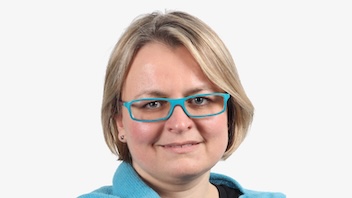
Dr. Alina Averchenkova is a Distinguished Policy Fellow and Lead for Governance and Legislation at the Grantham Research Institute on Climate Change and the Environment at the London School of Economics, and a visiting Senior Fellow at the Royal Elcano Institute.
With extensive experience on climate change and international development, Alina’s current work focuses on climate change governance and legislation around the world as well as capacity building and advisory to governments, parliaments, and international organizations on these issues. She is a founding member of the Knowledge Network on Climate Assemblies (KNOCA), a trustee of Legal Response International, and a member of Expert Advisory boards to the Carbon Neutrality Coalition and Green Deal Net. Prior to joining the Grantham Institute, Alina was Global Director for Climate Change and Carbon at KPMG. Prior to that, she worked for the carbon-asset manager First Climate in Zurich, and as a Programme Officer at the UNFCCC in Bonn. Alina’s professional experience moreover includes work for the Environmental Defense Fund in Washington DC, and for Metroeconomica Ltd. in Bath.
Alina holds a Ph.D. in Economics and International Development from the University of Bath. She is based in London, UK.
Owen Gaffney
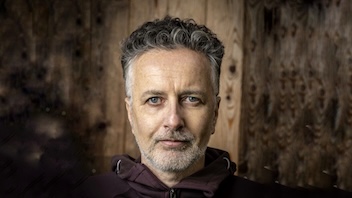
Owen Gaffney is a global sustainability writer, analyst, and strategist. He works at the nexus between science, policy, media, and business. Owen has worked for two decades in Earth system science with a focus on international climate and environmental policy. He has held positions at the Potsdam Institute for Climate Impact Research, the Stockholm Resilience Centre, Future Earth, and the International Geosphere Biosphere Programme.
Owen is an aeronautic and astronautic engineer by training and holds post-graduate qualifications in journalism and filmmaking. His background spans journalism, filmmaking, writing, communications, Earth-system science, and international policy.
Tuuli Kaskinen
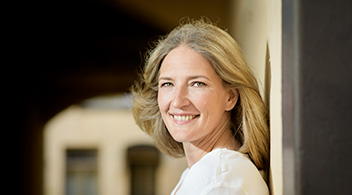
Tuuli Kaskinen is CEO at the Climate Leadership Coalition (CLC), the largest non-profit climate business network in Europe. She has 20 years of experience tackling climate change with companies, cities, and governments, in Finland, Europe, and beyond.
In addition to her work at the CLC, Tuuli serves as Board Member in several boards, including the Center for Research on Energy and Clean Air (CREA) and of the sustainable construction company Fira. Tuuli previously spent many years at Demos Helsinki, an independent think tank specializing in the smart use of natural and human resources, including as Director of Consultative Operations, Executive Director, Project Director, and Researcher. She has been Advisory Board Member of the energy company Fortum. Tuuli moreover has a background working on international climate policy and citizen engagement, as Climate Coordinator at the UN Association of Finland, as Policy Officer for Climate and Energy Policy at the Finnish Association for Nature Conservation, and as Co-founder and volunteer of the NGO Dodo Ry, where she organized environmental projects in Finland and in Mali.
Tuuli holds a Master's degree in International Business from Turku School of Economics. She is currently based in Helsinki, Finland.
Dylan Kava

Dylan Kava is an environmental advocate and political activist from Fiji working on advancing social and climate justice in the Pacific. He works in communications and outreach and has led and coordinated large-scale climate action and political campaigns throughout Fiji and the Pacific.
Dylan currently works as the Media and Communications Officer with the Pacific Islands Climate Action Network (PICAN), a regional alliance of civil society, non-governmental organisations and community groups working on climate justice issues in the Pacific. He also serves on the Executive Committee of the Uto ni Yalo Trust, a 72-foot, double-hulled, solar powered traditional sailing vessel that sails to promote sustainable sea transport and engages in community advocacy in Fiji. Dylan is the National Vice President of the National Federation Party of Fiji’s youth wing and also serves on the Secretariat of the Alliance for Future Generations—Fiji, the largest youth network working on sustainable development in Fiji.
Dylan has a background in politics, international relations, and journalism, from the University of the South Pacific. Dylan is currently based in Suva, Fiji.
Dr. Daniel Lindvall
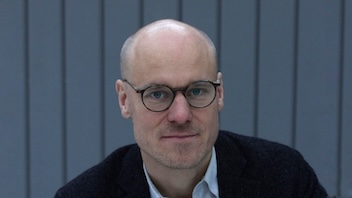
Dr. Daniel Lindvall is a Senior Researcher at the Climate Change Leadership Initiative at the Department of Earth Sciences in Uppsala University, and Senior Consultant at the sustainability consultancy 2050. Daniel has been involved in policymaking on democratic affairs in Sweden, and is the author of International IDEA’s Discussion Paper on Democracy and the Challenge of Climate Change.
Daniel’s research mostly focuses on the interrelation between democracy and climate governance, just transition, climate policy acceptance, and energy policies, with a particular focus on energy democracy and energy justice. He is also involved in a research project on wicked problem governance, comparing science-policy interaction in climate and Covid-19 governance. Daniel has ten years of experience in Swedish government offices, including as Deputy Director at the unit for Democratic Affairs. He was the Principle Inquire Secretary for the Swedish Government’s Democracy Commission from 2014 to2016, and Principle Inquire Secretary for three additional governmental inquires, on the regulation and public support of faith communities, on public support to the civil society, and on media information literacy. Daniel has moreover worked in different international organizations; as an advisor to the Human Rights Ombudsman of Bosnia and Herzegovina in 2001-2004, a Senior Media Development Officer for the Office of the High Representative in 2005, and as Political Advisor in the European Union Police Mission to Bosnia and Herzegovina.
Daniel has a Ph.D. in Sociology from Stockholm University. He has written several books on the issues of climate change and democracy, and published articles in various journals and newspapers. Daniel is based in Uppsala and Stockholm.
Hafsa Maalim

Hafsa Maalim currently serves as a Senior Associate Researcher at the Stockholm International Peace Research Institute (SIPRI), where she works on African peace and security issues, with a focus on climate, peace and security.
Hafsa has extensive experience in African multilateral affairs, with a focus on peace, security, climate and migration. Prior to joining SIPRI, Hafsa served as a Partnerships Officer and Focal Person on the African Union Peace Fund within the Office of the Commissioner, Department of Political Affairs, Peace and Security, African Union Commission. Hafsa also served as an analyst, partnerships, and policy coordinator for the Africa Climate Cluster, the AU's inter-departmental coordination mechanism. She also has ample expertise on the Horn of Africa, where she has worked for several years with various institutions, including International IDEA and the EU-Trust Fund's Research and Evidence Facility (EUTF-REF).
Hafsa has an educational background in Law with a focus on International Law.
Lindlyn Moma
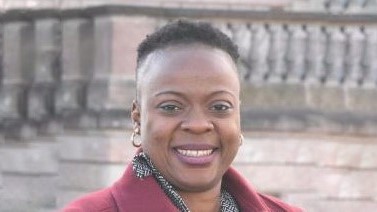
Lindlyn Moma serves as the Global Advocacy Director of the Laudato Si Movement, an organisation mobilising people of faith to safeguard our shared home. In addition, she is a visiting lecturer on climate justice at the Human Rights and Democracy in Africa Master of Law Program, at the University of Pretoria Faculty of Law. Lindlyn is a member of the Board of Advisers of International IDEA.
Lindlyn started her quest for justice by supporting communities adversely affected by gold mining companies in Ghana and West Africa. For five years, she co-led the African Initiative on Mining and Environment (hosted by Third World Network), which supported civil society groups challenging mining communities in Africa. From drafting mineral legislation with communities affected by mining in Ghana, to facilitating learning experiences with oil communities in Bayelsa State, Nigeria, and communities along the oil pipelines in Ecuador, Lindlyn’s heart and career have centred on protecting the right to a healthy environment for the sustainable development of all. In 2005, Lindlyn was civil society representative on the United Nations Economic Commission for Africa’s Mining Vision Advisory Group, with a pivotal role in shaping the African Mining Vision 2030. Lindlyn has consistently assumed leadership positions within the environmental justice sector, recently serving as the Africa Program Director for Greenpeace in Africa for over five years, and WildAid Africa.
Lindlyn holds a Bachelor of Law from the University of Buea, a Matric (French Postgraduate Honours Diploma) in Legal and Political Sciences, from L'Université Catholique del'Afrique Centrale, and a Master of Law in Human Rights and Democracy in Africa, from the University of Pretoria. She is pursuing a Doctors of Law (LLD) at the University of Pretoria, researching "The right to a healthy environment in a just transition to clean energy production in South Africa". Beyond professional and scholarly pursuits, Lindlyn finds solace and fulfilment in gardening, a passion she shares with her family. Additionally, she co-founded Miyaka Greens, an organisation promoting smallholder eco-agriculture. Lindlyn is based in Johannesburg, South Africa.
Sateeaved Seebaluck
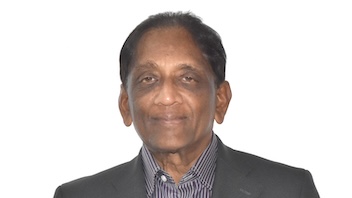
Sateeaved Seebaluck retired as the Secretary to the Cabinet and Head of the Civil Service in the Republic of Mauritius in September 2016. He was subsequently appointed as Special Adviser and Senior Adviser to the Prime Minister, respectively, until September 2020.
Sateeaved’s career in the Mauritian Civil Service spans over 40 years and culminated in his appointment as Secretary to Cabinet and Head of the Civil Service in January 2015. During his career he served at various Ministries and over 20 years at the Ministry of Environment. Sateeaved has broad experience in environment and sustainable development matters. He has a strong international exposure and has participated in many UNFCCC COP/MOP as main negotiator for Mauritius, where he has been a prominent advocate for the urgent need to limit temperature rise to 1.5C. He has also led national initiatives on climate change and the Sustainable Development of Small Island developing states.
Sateeaved holds a degree in Economics and a Diploma in Public Administration and Management from the University of Delhi and the University of Mauritius, respectively.
Marc Vanheukelen

Marc Vanheukelen recently retired from the European Commission after over thirty years of public service. His last role was as the EU’s first Climate Ambassador at the European External Action Service. Prior to this he held a number of senior roles at EU level, including Ambassador of the European Union to the World Trade Organisation and Director in the Commission’s trade department responsible for sustainable development, economic partnership agreements, agri-food and fisheries.
Dr. Rebecca Willis

Dr. Rebecca Willis is a Professor in Energy and Climate Governance at Lancaster Environment Centre, where she leads the Climate Citizens project. She has worked as researcher and advisor for many climate governance and climate action initiatives, and is the author of the 2020 book “Too Hot To Handle? The democratic challenge of climate change”, published by Bristol University Press.
Rebecca features on the Woman’s Hour Power List 2020, of30 women making an impact by helping to protect our planet. In 2020, Rebecca was an Expert Lead for Climate Assembly UK, the citizens’ assembly established by the UK Parliament. She is a Trustee of the New Economics Foundation and an Adviser to the National Lottery’s Climate Action Fund. Previously, Rebecca was a research fellow for the IGov project at the University of Exeter, investigating energy governance. From 2015-2019 she was a Member of the Scientific Advisory Committee of UKRI’s Energy Programme, and from 2011-15 she was a Council Member of the Natural Environment Research Council. Rebecca was Vice-Chair of the UK Sustainable Development Commission, advising the Prime Minister and First Ministers of the devolved administrations, from 2004-2011. In 2009, Rebecca founded Green Alliance’s Climate Leadership Programme, an initiative to support Members of the UK Parliament, and earlier served as Green Alliance’s Director.
Rebecca has a degree in Social and Political Sciences from the University of Cambridge, and a Ph.D. from Lancaster University. Rebecca is based outside Lancaster, UK.